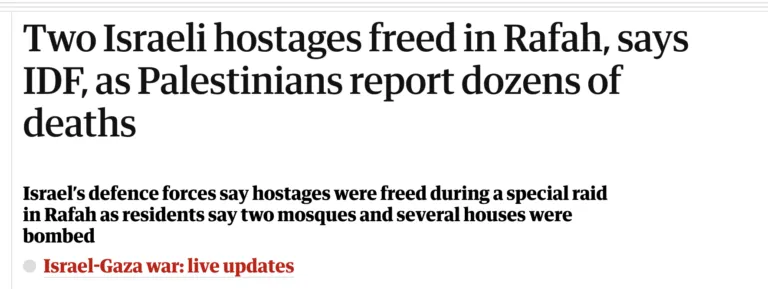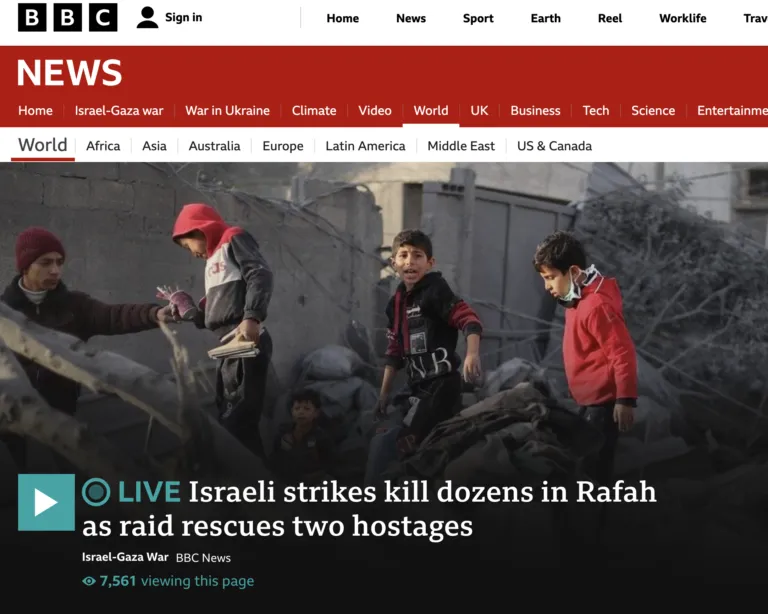News consumers deserve to know that they are being misled.
By Rinat Harash, Honest Reporting
Early on Monday, February 12, news outlets reported that Israel had rescued two hostages from Hamas captivity in Gaza.
But instead of sticking to the facts of the daring overnight raid in Rafah — which happen to justify Israel’s claim that the southern Gaza city is a Hamas stronghold — prominent news sites framed the story in a way that minimized the terror group’s role and presented Palestinians as the victims.
The result inverted reality: Positive news was portrayed as negative, and good became evil.
Such framing, which subtly cast doubt on the worthiness of the Israeli rescue operation, was achieved by using one or more of the following tactics:
Selectively using the word “freed” instead of “rescued.”
Uncritically emphasizing the number of Palestinians killed by Israeli airstrikes during the raid.
Adding lengthy paragraphs focusing on the plight of 1.4 million displaced Gazans in Rafah, and their fear of a potentially imminent Israeli invasion.
Ignoring Hamas altogether.
The Guardian, for example, packaged the first two points in a headline that reads: “Two Israeli hostages freed in Rafah, says IDF, as Palestinians report dozens of deaths”.
Who freed the hostages? Hamas? Islamic Jihad? An invisible force? Unclear.

Using the word “freed” rather than the value-laden “rescued” muddies the dramatic nature of the Israeli operation and whitewashes Hamas. That’s because it blurs the lines between the two sides and can also be mistakenly attributed to the terror group, as seen above.
But what’s worse is the added framing of Palestinian casualties — some of whom are undoubtedly terrorists killed in the raid.
And it’s not just in the headline.
The first paragraph of the story leads with the Palestinian death toll, according to “Gaza health officials,” who don’t differentiate between terrorists and civilians:
At least 50 Palestinians have been killed in Israeli strikes on the southern city of Rafah, according to Gaza health officials, as the Israeli military said it had freed two hostages during a raid by special forces on the city.
The rest of the story, except for 2.5 paragraphs dedicated to the Israeli hostages — includes 18.5 paragraphs on the suffering of displaced Palestinians in the area, amid global warnings against a looming Israeli invasion of Rafah.
It is not clear why such background paragraphs don’t include any information on Hamas’ entrenchment amid or under the civilian population of the city, particularly in light of the fact that Israeli hostages had been held in an apartment building there.
“Deadly” Strikes
The Guardian’s story was partly based on a Reuters report, which also used “freed” in its headline and framed the Israeli operation with unverified casualty numbers that serve the Palestinian narrative:
We've fixed your headline, @Reuters. The hostages were rescued, not "freed."
But who are the "67 killed"? Israeli soldiers killed many terrorists and came under heavy fire during the rescue operation.https://t.co/sgHVRC3OPY pic.twitter.com/IlMSdQhXn7
— HonestReporting (@HonestReporting) February 12, 2024
Unlike Reuters, the Associated Press and the BBC did use the verb “rescue.”
But they framed their headlines similarly:

And the live coverage page of the BBC still led with the lethal Israeli strikes:

Voice Of America went further and did not even mention the Israeli rescue operation in its headline about the Rafah strikes:
It's been some 9 hours since it was publicly announced that Israel had rescued two hostages from Rafah.
But the headline and story below are still the lead on the @VOANews website.https://t.co/2AkmWqS1GM pic.twitter.com/Fi1u5X643P
— HonestReporting (@HonestReporting) February 12, 2024
VOA’s story starts with what seems to be random Israeli air strikes that killed tens of Palestinians sheltering in Rafah. Again, no context is provided nor any critical caveat about the problematic source for Gaza’s casualty figures:
Israeli airstrikes Monday hit the southern city of Rafah, killing at least 67 people according to local health officials in the area of the Gaza Strip where 1.4 million civilians have already fled to in order to escape the war.
Residents described heavy bombing, with the Israeli strikes hitting several houses and mosques.
It’s not until the third paragraph that VOA mentions the Israeli rescue operation, although it is almost glossed over as a mere coincidence:
“…the strikes coincided with a mission that rescued two Israeli hostages who were being held by Hamas militants.
NBC News also made the Israeli airstrikes look like an indiscriminate bombing of Rafah, unrelated to the fact that Hamas had been holding the Israeli hostages there.

Ignoring Hamas
Some media outlets didn’t just change words or add context.
National Public Radio, for example, completely omitted Hamas from its story about the Israeli rescue operation.
It did not mention Hamas even once, as if the Israeli forces had been fighting an unidentified enemy:
The Israeli military said on Monday that special forces rescued two Israeli hostages held in Gaza.
Heavy airstrikes were conducted during the operation and there were initial reports that Palestinians were killed in the strikes.
How has @NPR published a report on the rescue of two Israeli hostages from Hamas captivity without mentioning the word "Hamas" even once? 😲https://t.co/6jd5y56LoI
— HonestReporting (@HonestReporting) February 12, 2024
Disturbingly, NPR relied on a military report that clearly identified Hamas as the group that kidnapped the hostages on October 7, while its terrorists killed 1,200 people in southern Israel and abducted some 240 others.
Why did NPR ignore that?
Whatever the reason, the result is the whitewashing of the murderers responsible for taking the hostages in the first place.
Indeed, it’s possible to sum up by repeating the cliche that framing is everything.
But it shouldn’t be.
Journalists should avoid it and simply report the facts accurately.
They should also be aware of the ramifications of their words, especially when these words are used to minimize evil — the evil of a terror group that holds hostages while using innocent civilians as a human shield.
And when journalists fail to do so, news consumers deserve to know that they are being misled.
